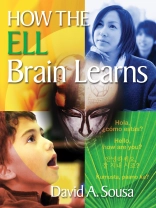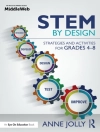’This book is one of the best I′ve read on how the brain functions in second language learners and is invaluable for understanding ELLs with learning disabilities.’
—Irma Guadarrama, Professor
University of Texas-Pan American College of Education
’David Sousa brings together all of the research about the brain to show the process of learning multiple languages and offers ways to implement effective teaching strategies with quality instruction.’
—Sharon Latimer, ESL Teacher
Plano ISD, TX
Raise your ELL success quotient and watch student achievement soar!
Teachers are more likely to succeed if they have a deeper understanding of the challenges students face in trying to learn English and course content simultaneously. How the ELL Brain Learns combines current research on how the brain learns language with strategies for teaching English language learners in K–12 classrooms. Award-winning author and brain research expert David A. Sousa describes the linguistic reorganization needed to acquire another language after the age of 5 years. He supplements this information with immediately applicable tools, including:
- A self-assessment pretest for gauging your understanding of how the brain learns languages
- Ready-to-use brain-compatible strategies for teaching English learners across the curriculum
- An entire chapter about how to detect English language learning problems, with sections on the social, cultural, and physical causes
Each chapter features teaching tips that translate the research into step-by-step classroom applications. Also included are intervention strategies to use with struggling ELLs, including methods for working with older students.
Innehållsförteckning
List of Teaching Tips
About the Author
Acknowledgments
Introduction
Who are English Language Learners?
About This Book
What Do You Already Know?
1. Learning the First Language(s)
Spoken Language Comes Naturally
Structure of Language
Levels of Language Comprehension
Learning Two First Languages
What′s Coming
Key Points to Ponder
2. Learning a New Language (English) Later
The Challenge of Acquiring a New Language Later
Learning English Is Not Easy
What’s Coming
Key Points to Ponder
3. Teaching English Language Listening and Speaking
Searching for the Best Model
Listening
Speaking
What′s Coming
Teaching Tips
Key Points to Ponder
4. Teaching English Language Reading and Writing
Reading
Writing
What′s Coming
Teaching Tips
Key Points to Ponder
5. Teaching Language Arts and Social Studies
The Language Components of Learning Content in English
Teaching English Language Arts to ELLs
Teaching Social Studies to ELLs
What’s Coming
Teaching Tips
Key Points to Ponder
6. Teaching Mathematics and Science
Teaching Mathematics to ELLs
Teaching Science to ELLs
What’s Coming
Teaching Tips
Key Points to Ponder
7. Recognizing and Addressing Problems in Learning English
Learning Problem or Learning Disability?
Helping ELLs With Learning Disabilities
What’s Coming
Teaching Tips
Key Points to Ponder
8. Putting It All Together
The Diversity of English Language Learners
Misconceptions About ELLs and English Language Acquisition
Basic Components for ELL Instruction
Gifted and Talented ELLs
Conclusion
Teaching Tips
Key Points to Ponder
Glossary
References
Resources
Index
Om författaren
DR. David A. Sousa is an international consultant in educational neuroscience and author of more than twenty books that suggest ways educators and parents can translate current brain research into strategies for improving learning. A member of the Cognitive Neuroscience Society, he has conducted workshops in hundreds of school districts on brain research, instructional skills, and science education at the pre K–12 and university levels. He has made presentations to more than two hundred thousand educators at national conventions of educational organizations and to regional and local school districts across the United States, Canada, Europe, Australia, New Zealand, and Asia. Dr. Sousa has a bachelor’s degree in chemistry from Bridgewater State University in Massachusetts, a master of arts in teaching degree in science from Harvard University, and a doctorate from Rutgers University. His teaching experience covers all levels. He has taught senior high school science and served as a K–12 director of science, supervisor of instruction, and district superintendent in New Jersey schools. He was an adjunct professor of education at Seton Hall University for ten years and a visiting lecturer at Rutgers University. Prior to his career in New Jersey, Dr. Sousa taught at the American School of Paris (France) and served for five years as a foreign service officer and science advisor at the US diplomatic missions in Geneva (Switzerland) and Vienna (Austria). Dr. Sousa has edited science books and published dozens of articles in leading journals on professional development, science education, and educational research. His most popular books for educators include How the Brain Learns, now in its sixth edition; How the Special Needs Brain Learns, second edition; How the Gifted Brain Learns; How the Brain Learns to Read, second edition; How the Brain Influences Behavior; How the ELL Brain Learns; Differentiation and the Brain, second edition (with Carol Tomlinson); and How the Brain Learns Mathematics, second edition, which was selected by the Independent Book Publishers Association as one of the best professional development books. The Leadership Brain suggests ways for educators to lead today’s schools more effectively. Dr. Sousa’s books have been published in French, Spanish, Chinese, Arabic, Korean, Russian, and several other languages. His book Brainwork: The Neuroscience Behind How We Lead Others is written for business and organizational leaders. Dr. Sousa is past president of the National Staff Development Council (now called Learning Forward). He has received numerous awards from professional associations, school districts, and educational foundations for his commitment to research, staff development, and science education. He received the Distinguished Alumni Award and an honorary doctorate from Bridgewater State University and an honorary doctorate in humane letters from Gratz College in Philadelphia. Dr. Sousa has been interviewed on the NBC Today show, by other television programs, and by National Public Radio about his work with schools using brain research. He makes his home in south Florida.












